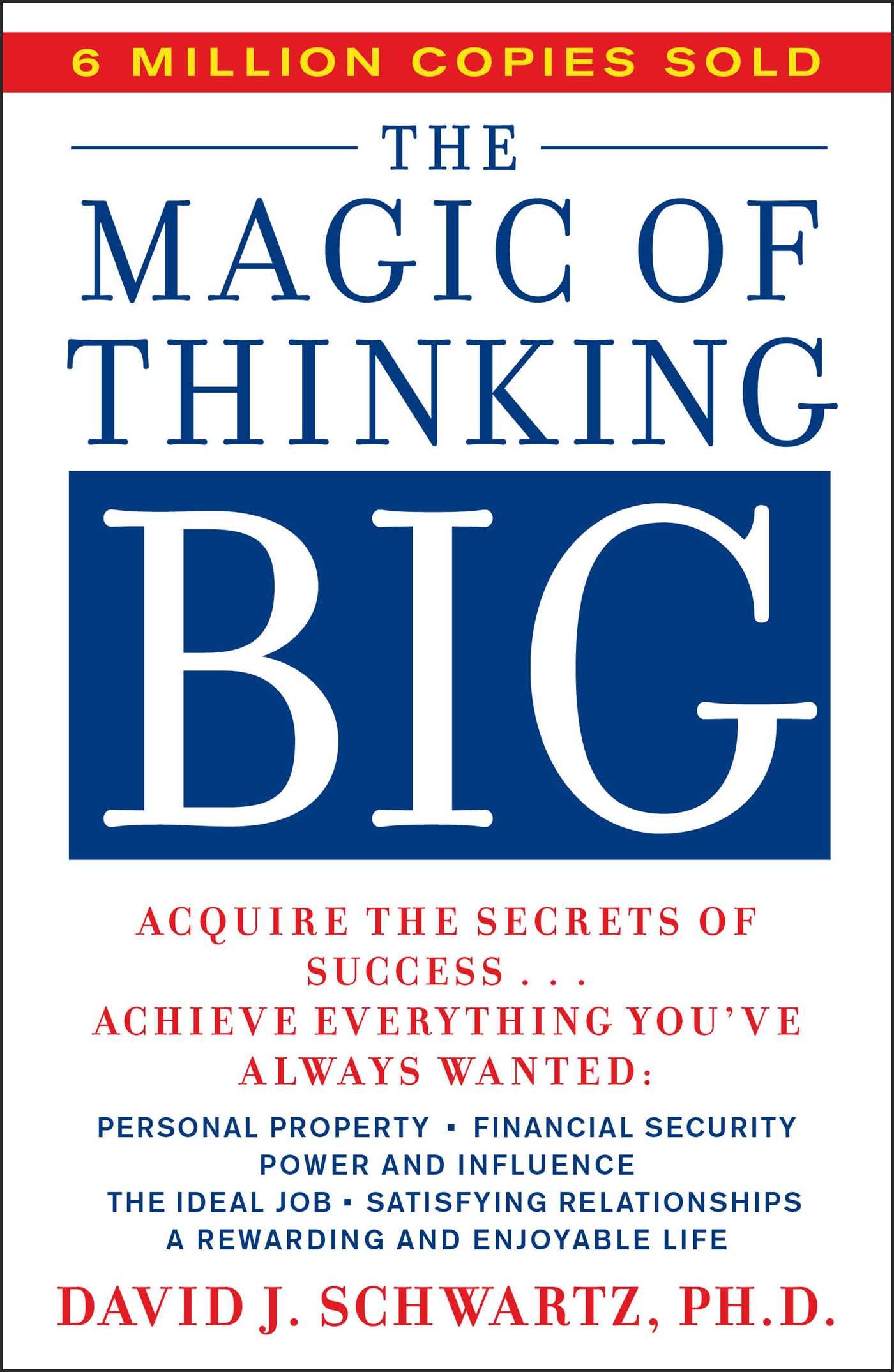The Magic of Thinking Big
One of the best self help books ever written!
The Magic of Thinking Big book has been one of the most influential and impactful books in my life.
I've just recently read this book for about the 4th or 5th time. To help me remember the key points and content, I've summarized them here on this site. Consider this as my "Book Report" summary. There are so many good principles and quotes to learn and apply! I hope that they help you too. To offer the greatest benefit though, I highly suggest you buy and read this book.
The Magic of Thinking Big
Book Title: The Magic of Thinking Big
Author: David J. Schwartz (PHD)
David Josephy Schwartz, Jr. was an American motivational writer and coach, best known for authoring The Magic of Thinking Big in 1959. He was a professor of marketing at Georgia State University, Chair of Consumer Finance at Georgia State University and president of Creative Educational Services Inc,, a consulting firm specializing in leadership development.
Born: March 23, 1927
Died: December 6, 1987
Reason to Read this Book: One of the best books on self-help ever published.
Year Written: 1959

Key Points:
The Magic of Thinking Big is not only a great expression, it happens to be the title of one of the best self help books ever written. I have read this book many times over the last 20 years. Following are some of the key points I've made note of to help me (and you).
- Your beliefs are like a Thermostat. Your success will never exceed that of your beliefs.
- Compliment people on their appearance, their work, their achievements, their families , p70
- Practice speaking up in all group settings in the way of a question or suggestion, p62
- Think like my most productive years are still ahead of me, p43
- Remember the ability to think is more important the ability to memorize facts, p39
- Practice b being a big thinker. See your companies interests as your own, p76
- Be an "experimental" person, exposing ourselves to new things, p89
- Before each day, think for 10 minutes on how I can do a better job today, p91
- Look important always. When you look good, you feel good. Spend 2x as much and buy 1/2 as much, p103
- To get high quality work, be enthusiastic about the job I want done, p111
- Ask myself daily, am I worthy of being imitated in every way, p111
- Prepare my own "commercial" to sell myself to myself, p114
- It's good to make new friends and enlarge our social orbit, p127
- Go 1st class in everything we do/spend, p130
- To get other people enthusiastic, you must first be enthusiastic yourself, p134-136
- To get enthusiastic, learn about the thing you are not enthusiastic about, p136 Dig into it deeper on people technique
- In everything you do, life it up, p137-138
- Broadcast good news, p138-139
- Grow the "You are important attitude", p140
- Treat every human being as important, p144
- Do something special for our family often, p146
- Always give people more than they expect to get, p150
- Being likeable is a key contributor to success, p152
- Practice liking people, p153
- Always take the initiative to introduce yourself first, p156
- Customers and employees should be treated like guests in your own home, p160
- Conversation generosity is the easiest and surest way to win a friend, p162
- Get the "speak up" habit (don't hold it back), p177
- Be a crusader. When you see something that ought to be done, pick up the ball and run with it, p179
- Be an "Activationist"/ Doer! Don't wait until things are perfect, p181
- Commit to "school" for one night a week for life, p210
- Subscribe to 1 or 2 magazines which stimulate ideas, p21-
- The primary purpose of life is to enjoy it, p221
- Praise is the greatest single incentive you can give someone, p221
- Think, talk, act, live the way you want subordinates to act, p225
Good quotes:
I love goals quotes and all quotes about self help and personal development. Below are some good quotes from the book, The Magic of Thinking Big.
"A goal is more than a dream; it's a dream being acted upon. A goal is more than a hazy "Oh, I wish I could." A goal is a clear "This is what I'm working toward" Nothing happens, no forward steps are taken until a goals is established. Without goals individuals just wander through life. They stumble along, never knowing where they are going, so they never get anywhere" - pg 195
"Goals are as essential to success as air is to life. No one ever stumbles into success without a goal. No one ever lives without air. Get a clear fix on where you want to go"
"Many people, millions of them, can find new energy by selecting a goal and giving all they've got to accomplish that goal. Goals cure boredom. Goals even cure many chronic ailments." page 201
Automatic Goal Attainment:
How your subconscious mind works to attain your goal
from page 201-202 of the The Magic of Thinking Big by David Schwartz
"The most amazing thing about a deeply entrenched goal is that it keeps you on course to reach your target. This isn't double-talk. What happens is this. When you surrender to your goal, the goal works itself into your subconscious mind. Your subconscious mind is always in balance. Your conscious mind is not, unless it is in tune with what your subconscious mind is thinking. Without full cooperation from the subconscious mind, a person is hesitant, confused, indecisive. Now, with your goal absorbed into your sub-conscious mind you react the right way automatically. the conscious mind is free for clear, straight thinking".
"Let's illustrate this with two hypothetical persons. As you read on you'll recognize these characters among the real people you know. We'll call them Tom and Jack. These fellows are comparable in all respects except one. Tom has a firmly-entrenced goal. Jack does not. Tom has a crystal-clear image of what he wants to be. He pictures himself as a corporation vice-president ten years hence.
Because Tom has surrendered to his goal, his goal through his subconscious mind signals to him saying "do this" or "don't do that"; it won't help get you where you want to go". The goal constantly speaks, "I am the image you want to make real. Here is what you must do to make me real".
Tom's goal does not pilot him in vague generalities. It gives him specific directions in all his activities. When Tom buys a suit, the goal speaks and shows Tom the wise choice. The heal helps to show Tom what steps to take to move up to the next job, what do say in the business conference, what to do when conflict develops, what to read, what stand to take. Should Tom drift a little off course, his automatic instrumentation housed securely in his subconscious mind alerts him and tells him what to do to get back on course.
Tom's goal has made him supersensitive to all the many forces at work which affect him.
Jack, on the other hand, lacking a goal, also lacks the automatic instrumentation to guide him. He is easily confused. His actions reflect no personal policy. Jack wavers, shifts, guesses at what to do. Lacking consistency of purpose, Jack flounders on the rutty road to mediocrity.
May I suggest you re-read the above section, right now. Let this concept soak in. Then look around you. Study the very top echelon of successful persons. Note how they, without exception, are totally devoted to their objective. Observe how the life of a highly successful person is integrated around a purpose.
Surrender to that goal. Really surrender. Let it obsess you and give you the automatic instrumentation you need to reach that goal.
The Killers of Success:
One of the best chapters in The Magic of Thinking Big has to do with common things that will kill our success. I recognize some of these in myself.
All of us have desires. All of us dream of what we really want to do. But few of us actually surrender to desire. Instead of surrendering to desire, we murder it. Five weapons are used to commit success-suicide. Destry them. They're dangerous.
1. Self-Deprecation. You have heard dozens of people say, "I would like to be a doctor (or an executive or a commercial artist or in business for myself) but I can't do it." "I lack brains." "I'd fail if I tried." I lack the education and/or experience." Many young folks destroy desire with the old negative self-depreciation.
2. Security-itis. Persons who say, "I've got security where I am" use the security weapons to murder their dreams.
3. Competition. "The field is already overcrowded," "People in that field are standing on top of each other" are remarks which kill desire fast.
4. Parental Dictation. I've heard hundreds of young people explain career choice with "I'd really like to prepare for something else, but my parents want me to do this so I must." Most parents I believe, do not intentionally dictate to their children what they just do. What every intelligent parent wants is to see their children live successfully. If the young person will patiently explain why he or she prefers a different career, and if the parent will listen, there will be no friction. the objectives of both the parent and the young person for the young person's career are identical: success.
5. Family relationships. The attitude of "It would have been wise for me to change over five years ago, but now I've got a family and I can't change," illustrates this kind of desire murder weapon.
Throw away those murder weapons! Remember, the only way to get full power , to develop full go-force, is to do what you want to do. Surrender to desire and gain energy, enthusiasm, mental zip, and even better health.
And it's never too late to let disrespect take over.
The overwhelming majority of really successful people work much longer than 40 hours a week.
Action Plan to Improve your life:
30-Day Improvement Guide
Between now and _______ I will
A. Break these habits: (suggestions)
- Putting off things.
- Negative Language
- Watching TV more than 60 minutes per day
B. Acquire these habits: (suggestions)
- A rigid morning examination of my appearance
- Plan each day's work the night before.
- Compliment people at every possible opportunity
C. Increase my value to my employer in these ways: (suggestions)
- Do a better job of developing my subordinates.
- Learn more about my company, what it does and the customers it serves.
- Make three specific suggestions to help my company become more efficient
D. Increase my value to my home in these ways: (suggestions)
- Show more appreciation for the little things my wife does which I've been taking for granted.
- Once each week, do something special with my whole family.
- Give one hour each day of my undivided attention to my family.
E. Sharpen my mind in these ways: (suggestions)
- Invest two hours each week reading professional magazines in my field.
- Read one self-help book.
- Make four new friends.
- Spend 30 minutes daily in quiet, undisturbed thinking.
This action plan from the book, The Magic of Thinking Big by David Schwartz, page 206-207
This is one of the best Personal Development Action Plans I've come across.
Goal Action Plan:
I've read many goal action plans in my life. This goal action plan from The Magic of Thinking Big is one of the best.
- Get a clear fix on where you want to go. Create an image of yourself 10 years from now.
- Write out your 10-year life plan. Your life is too important to be left to chance. Put down on paper what you want to accomplish in your work, your home and your social departments.
- Surrender yourself to your desires. Set goals to get things done. Set goals and discover the real enjoyment of living.
- Let your major goal be your automatic pilot. When you let your goal absorb you, you'll find yourself making the right decisions to reach your goal.
- Achieve your goal one step at a time. Regard each task you perform, regardless of how small it may seem, as a step toward your goal.
- Build 30-day goals. Day-by-day effort pays off.
- Take detours in stride. A detour simply means another route. It should never mean surrendering the goal.
- Invest in yourself. Purchase those things that build mental power and efficiency. Invest in education. Invest in idea starters.
Page 210-211
How to be an effective leader
To be a More Effective Leader, Put these Four Leadership Principles to Work
- Trade minds with the people you want to influence. It's easy to get others to do what you want them to do if you'll see things through their eyes. Ask yourself this question before you act: "What would I think of this, if I exchanged places with the other person?"
- Apply the "Be-Human" rule in your dealings with others. Ask, "What is the human way to handle this?" In everything you do, show that you put other people first. Just give other people the kind of treatment you like to receive.
- Think progress, believe in progress, push for progress. Think improvement in everything you do. Think high standards in everything you do. Over a period of time subordinates tend to become carbon copies of their chief. Be sure the master copy is worth duplicating. Make this a personal resolution: "At home, at work, in community life, if it's progress I'm for it."
- Take time out to confer with yourself and tap your supreme thinking power. Managed solitude pays off. Use it to release your creative power. Use it to find solutions to personal and business problems. So spend some time alone every day just for thinking. Use the thinking technique all great leaders use. Confer with yourself.
From page 229-230 of the book, the Magic of Thinking Big by David Schwartz.
Is retirement really necessary?
I think a lot about retirement. It's no surprise given my age. But I find myself getting depressed sometimes when I think about the whole idea of retirement. Something about retiring from something that you've been productive throughout your entire life. Below is a small section from The Magic of Thinking Big about someone successful who took retirement to entirely different level
The other extreme, the visible way to retire, is the "I'm going to pitch right in and start fast" method. One of my finest friends, Lew Gordon, has chosen this way to retire. Lew's retirement several years ago as a vice-president of Atlanta's biggest bank was really Commencement Day for him. He established himself as a business consultant. And his pace is amazing.
Now in his sixties, he serves numerous clients and is national demand as a speaker. One of his special projects is helping to build Pi Sigma Epsilon, a young but fast-growing fraternity for professional salesmen and sales executives. Every time I see Lew he seems younger. He's a young 30 in spirit. Few people I know of any age are reaping more from life than this senior citizen who resolved not to go out to pasture.
from page 204
I highly recommend you purchase The Magic of Thinking Big and read it 2X, 5X or even 10X over the course of your next decade!!
Last updated: October 31, 2020

